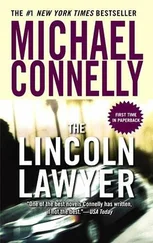Bosch took the yellowed print card out of the briefcase and held it out to the man. Hirsch looked at it but didn’t take it. He looked back at the computer screen and Bosch placed the print card down on the keyboard in front of him.
“And, well, as you know, that was before we had these fancy computers and all of this technology you got here. All they did with this back then was use it to compare these to a suspect’s prints. They got no match, they let the guy go and then they just shoved these in an envelope. They’ve been sitting in the case file ever since. So what I was thinking was, we could-”
“You want to run them through AFIS.”
“Yeah, right. You know, take a shot at it. Spin the dice, maybe we get lucky and pick up a hitchhiker on the information highway. It’s happened before. Edgar and Burns out on the Hollywood table nailed an old one this week with an AFIS run. I was talking to Edgar and he said one of you guys down here-I think it was Donovan-said the computer has access to millions of prints from all across the country.”
Hirsch nodded unenthusiastically.
“And that’s not just criminal print files, right?” Bosch asked. “You’ve got military, law enforcement, civil service, everything. That right?”
“Yes, that’s right. But, look, Detective Bosch, we-”
“Harry.”
“Okay, Harry. This is a great tool that’s getting better all the time. You’re correct about that but there still are human and time elements here. The comparison prints have to be scanned and coded and then those codes have to be entered into the computer. And right now we have a backup that’s running twelve days.”
He pointed to the wall above the computer. There was a sign with changeable numbers on it. Like the signs in the union office that said X number of days since the last death in the line of duty.
AUTOMATED FINGERPRINT IDENTIFICATION SYSTEM
Search Requests Will Take 12 Days To Process
No Exception!
“So, you see, we can’t take everybody who walks in here and put them at the front of the pack, okay? Now if you want to fill out a search request form, I can-”
“Look, I know there are exceptions. Especially in homicide cases. Somebody made that run for Burns and Edgar the other day. They didn’t wait twelve days. They were put through right away and they cleared three homicides just like that.”
Bosch snapped his fingers. Hirsch looked at him and then back to the computer.
“Yes, there are exceptions. But that comes from on high. If you want to talk to Captain LeValley, maybe she’ll approve it. If you-”
“Burns and Edgar didn’t talk to her. Somebody just did it for them.”
“Well, then that was against the rules. They must have known somebody who did it for them.”
“Well, I know you, Hirsch.”
“Why don’t you just fill out a request and I’ll see what-”
“I mean, what’s it take, ten minutes?”
“No. In your case much longer. This print card you have is an antique. It’s obsolete. I’d have to run it through the Livescan machine, which would then assign codes to the prints. Then I’d have to hand-enter the codes it gives me. Then depending on the restrictions on the run you want, it could take-”
“I don’t want any restrictions. I want it compared to all data bases.”
“Then the computer time can run as long as thirty, forty minutes.”
With a finger Hirsch punched his glasses back up his nose as if punctuating his resolve not to break the rules.
“Well, Brad,” Bosch said, “the problem is I don’t know how much time I’ve got on this. Certainly not twelve days. No way. I’m working on it now because I have the time, but the next time I get a fresh call that will be it, I’ll be off it. That’s the nature of homicide, you know? So, are you sure there isn’t something we can do right now?”
Hirsch didn’t move. He just stared at the blue screen. It reminded Bosch of the youth hall, when kids would literally shut down like a computer on standby when the bullies taunted them.
“What are you doing now, Hirsch? We could do it right now.”
Hirsch looked at him for a long moment before talking.
“I’m busy. And look, Bosch, I know who you are, okay? That’s an interesting story about pulling old cases but I know it’s a lie. I know you’re on a stress leave. The story’s getting around. And you shouldn’t even be here and I shouldn’t be talking to you. So, could you please leave me alone? I don’t want to get into trouble. I don’t want people to get the wrong idea, you know?”
Bosch looked at him but Hirsch’s eyes had moved back onto the computer screen.
“Okay, Hirsch, let me tell you a real story. One-”
“I really don’t want any more stories, Bosch. Why don’t you just-”
“I’m going to tell you this story, then I’m leaving, okay? Just this one story.”
“Okay, Bosch, okay. You tell the story.”
Bosch looked at him silently and waited for Hirsch to make eye contact but the latent print technician’s eyes remained on the computer screen as if it were his security blanket. Bosch told the story anyway.
“One time, a long time ago, I was almost twelve and I’m swimming in this pool, you see, and I’m under the water but I’ve got my eyes open. And I look up and I see up through the water up to the edge of the pool. I see this dark figure. You know, it was hard to figure out what it was, all wavy and all. But I could tell it was a man and there wasn’t supposed to be a man up there. So I came up for air at the side of the pool and I was right. It was a man. He was wearing this dark suit. And he reached down and grabbed me by the wrist. I was just a scrawny little runt. It was easy for him to do. He pulled me out and he gave me this towel to put on my shoulders and he led me over to a chair and he told me…he told me that my mother was dead. Murdered. He said they didn’t know who did it, but whoever he was, he left his fingerprints. He said, ‘Don’t worry, son, we got the fingerprints and they’re as good as gold. We’ll get him.’ I remember those words exactly. ‘We’ll get him.’ Only they never did. And now I’m going to. That’s my story, Hirsch.”
Hirsch’s eyes dropped down to the yellowed print card on the keyboard.
“Look, man, it’s a bad story, but I can’t be doing this. I’m sorry.”
Bosch stared at him a moment and then slowly stood up.
“Don’t forget the card,” Hirsch said.
He picked it up and held it up to Bosch.
“I’ll leave it here. You’re going to do the right thing, Hirsch. I can tell.”
“No, don’t. I can’t do-”
“I’m leaving it here!”
The power of his voice shocked even Bosch and it seemed to have scared Hirsch. The print tech replaced the card on the keyboard. After a few seconds of silence Bosch leaned down and spoke quietly.
“Everybody wants the chance to do the right thing, Hirsch. It makes them feel good inside. Even if doing it doesn’t exactly fit inside the rules, sometimes you have to rely on the voice inside that tells you what to do.”
Bosch stood back up and took out his wallet and a pen. He pulled out a business card and wrote some numbers on it. He put it down on the keyboard next to the print card.
“That’s got my portable and my home on it. Don’t bother calling the office, you know I won’t be there. I’ll be waiting to hear from you, Hirsch.”
He walked slowly out of the lab.
WAITING FOR THE elevator, Bosch guessed that his effort to persuade Hirsch had fallen on deaf ears. Hirsch was the type of guy whose exterior scars masked deeper interior wounds. There were a lot in the department like him. Hirsch had grown up intimidated by his own face. He’d probably be the last person to dare go outside the bounds of his job or the rules. Another department automaton. For him, doing the right thing was ignoring Bosch. Or turning him in.
Читать дальше












